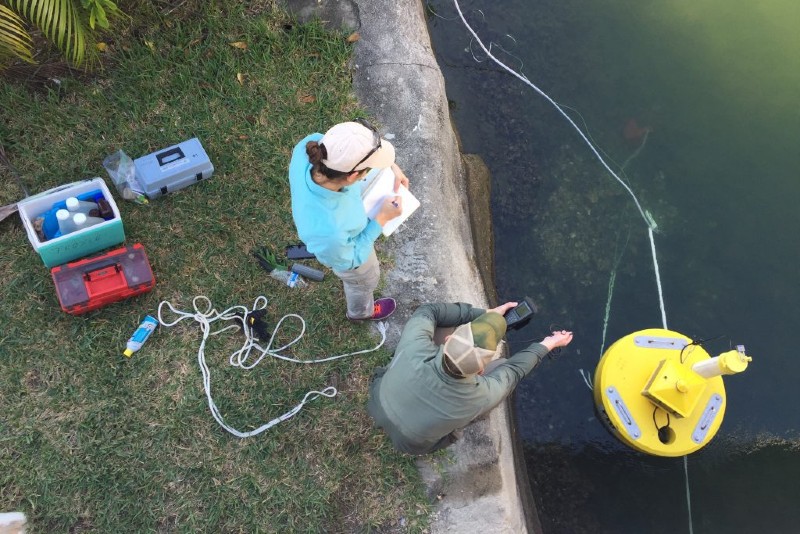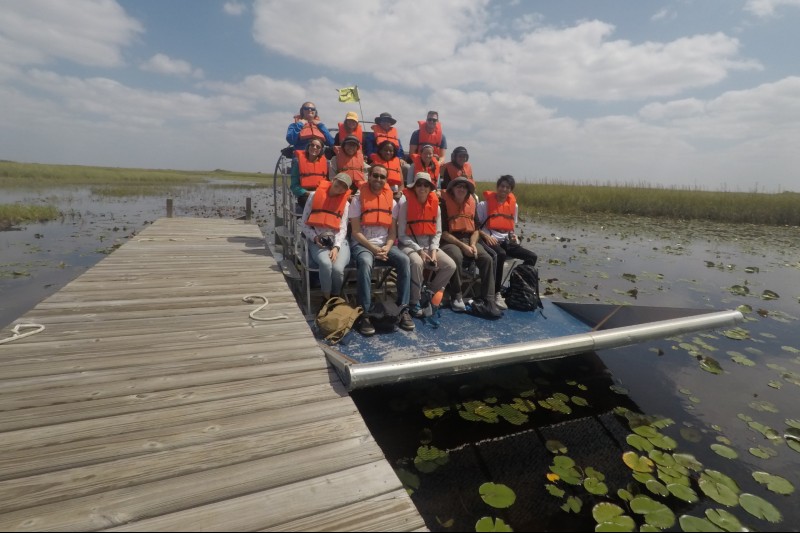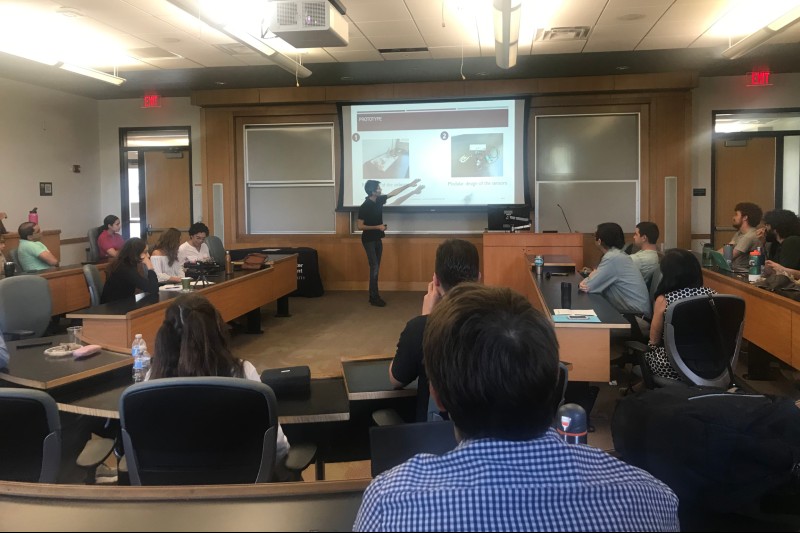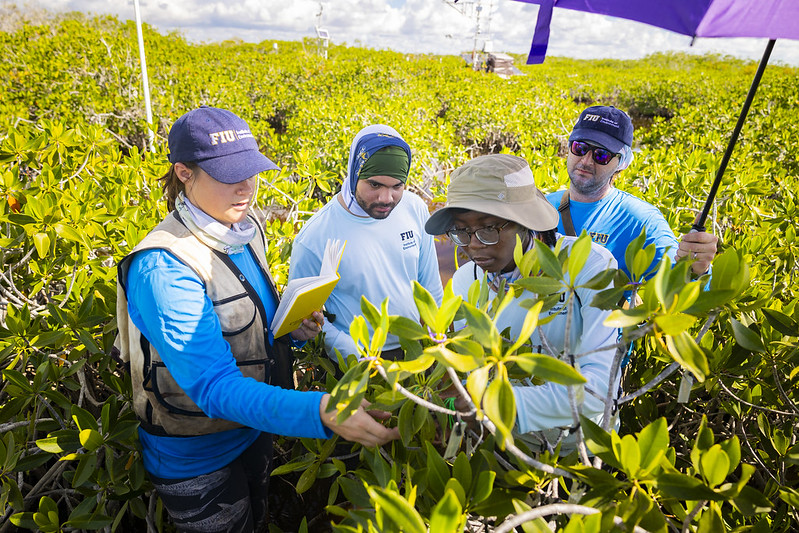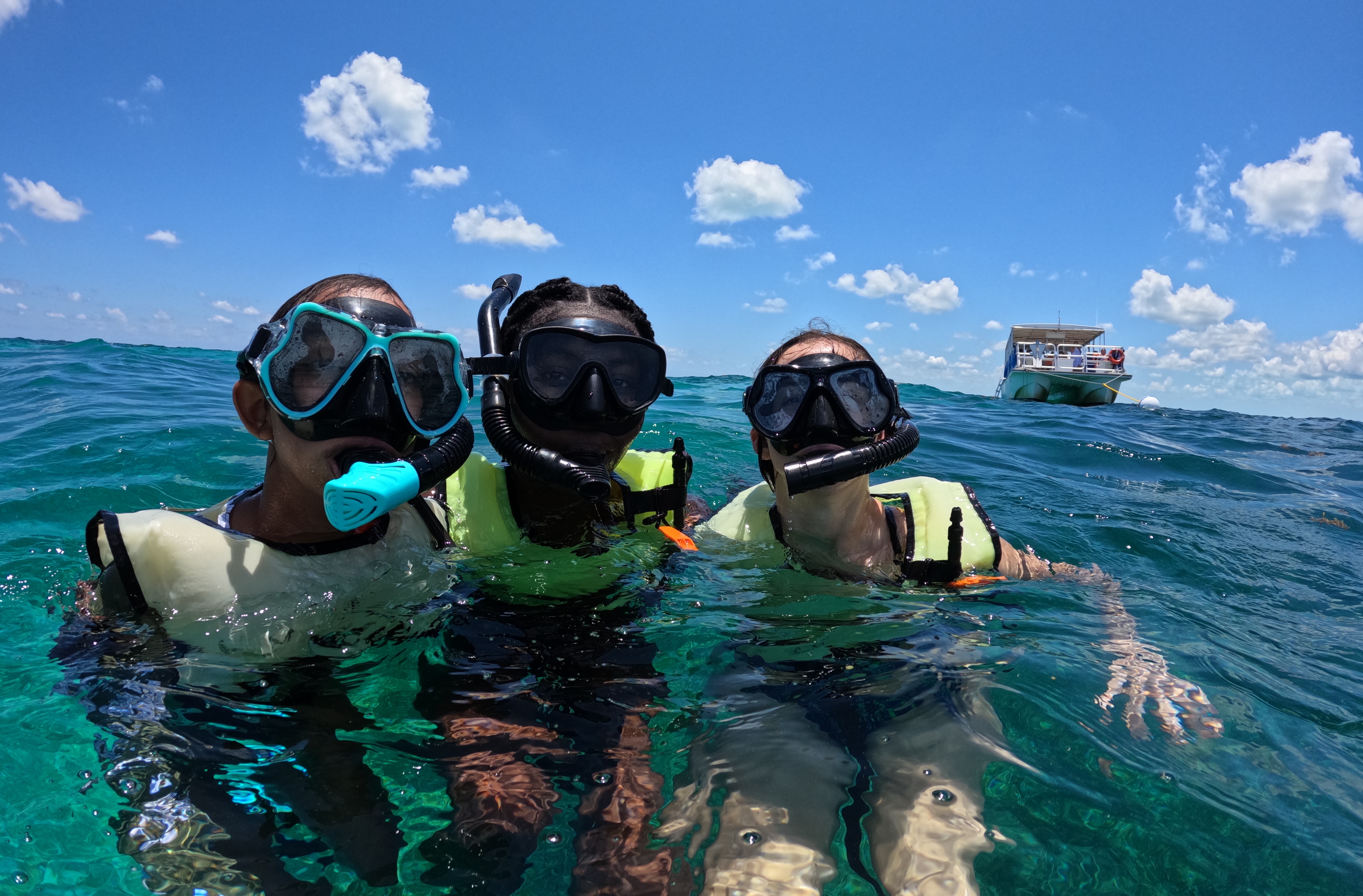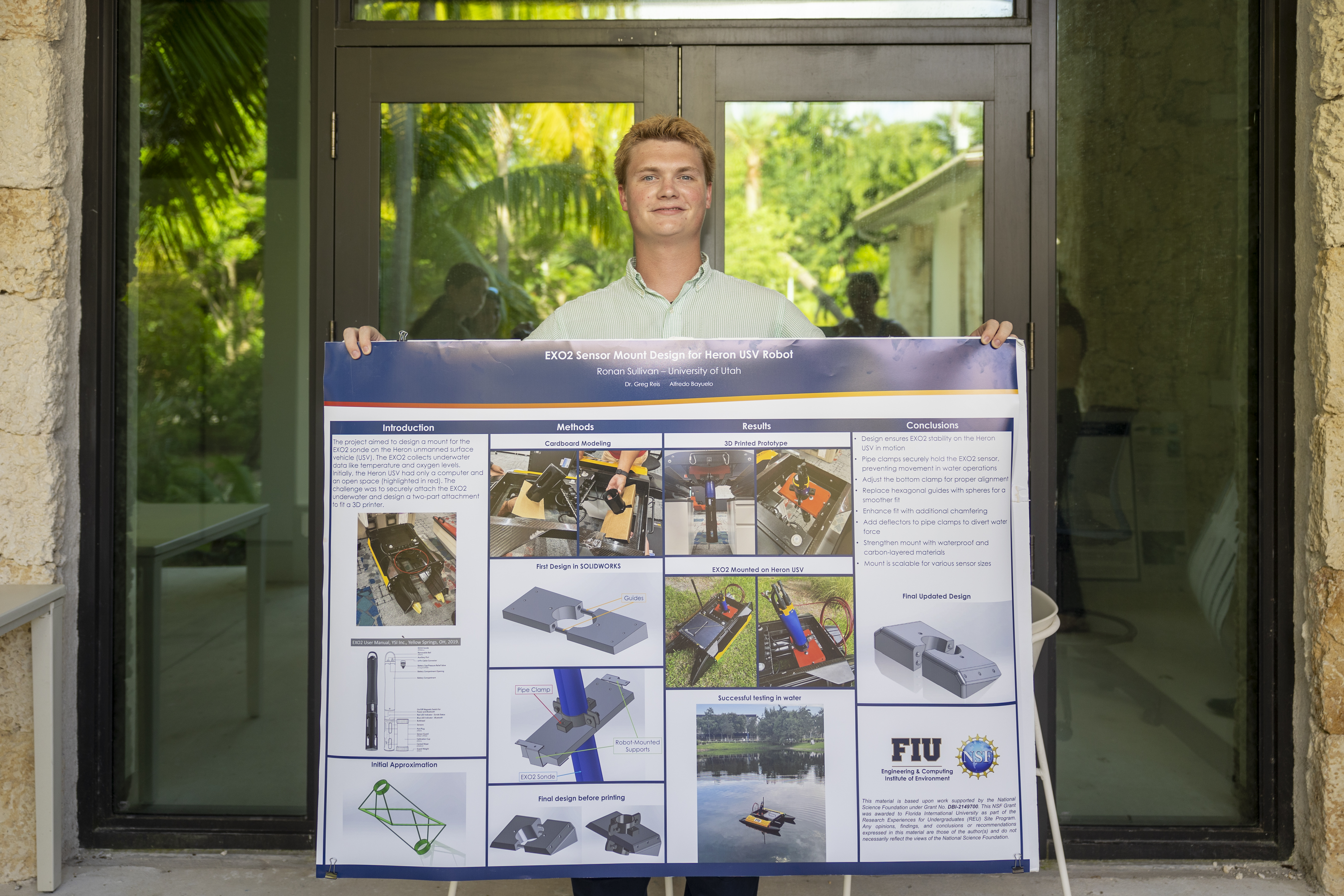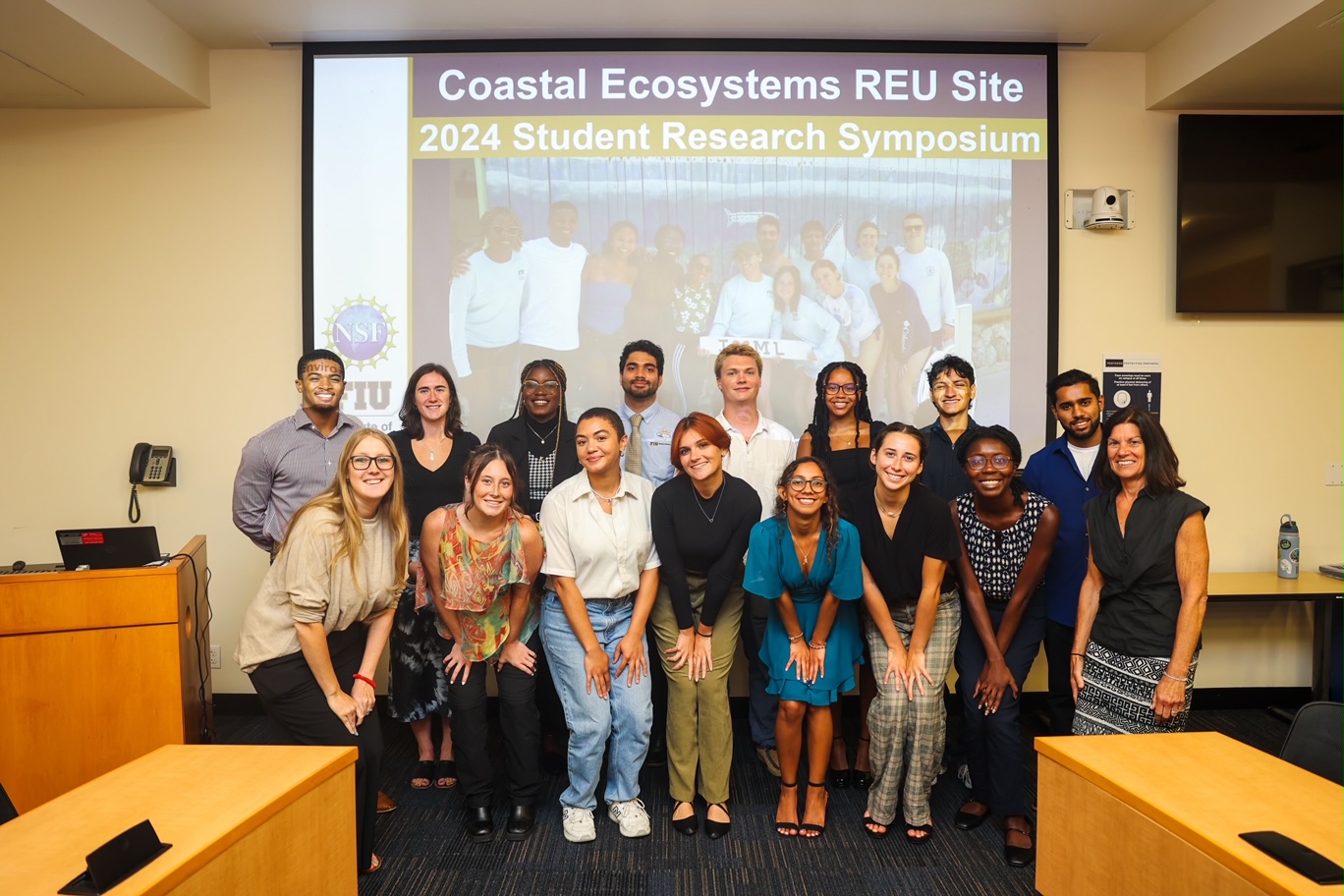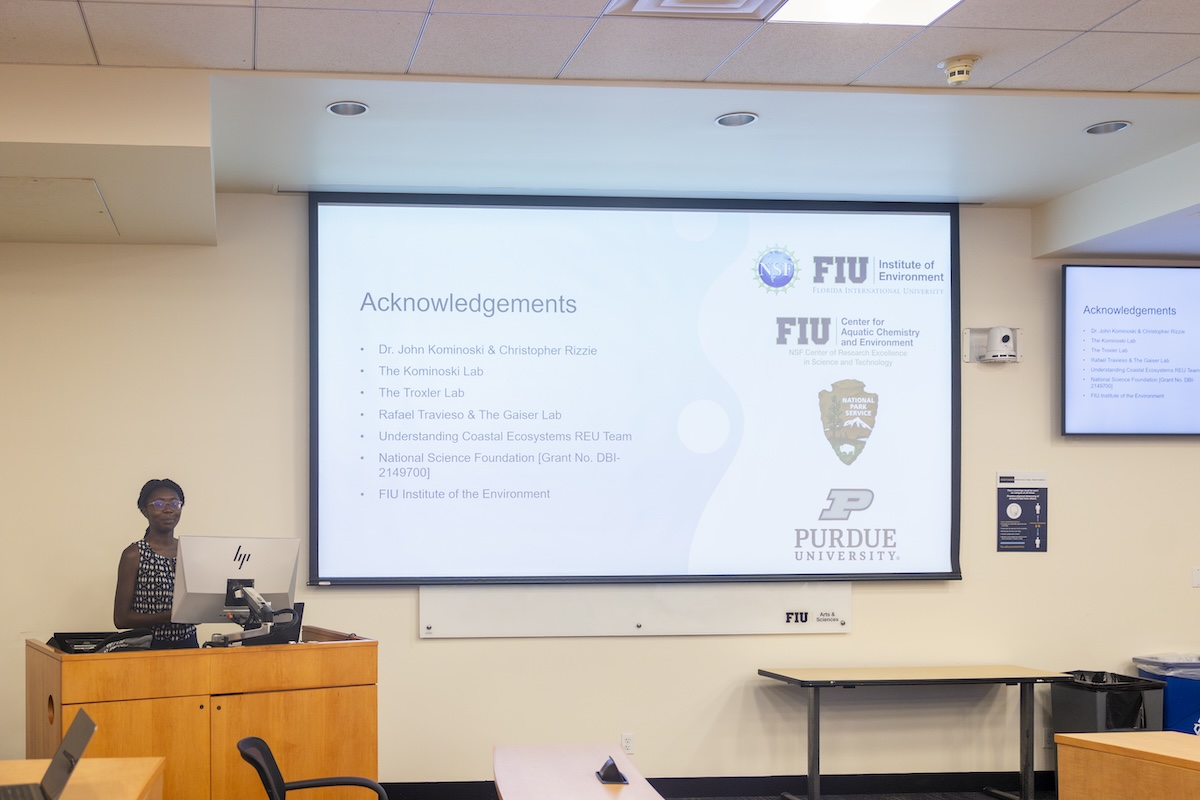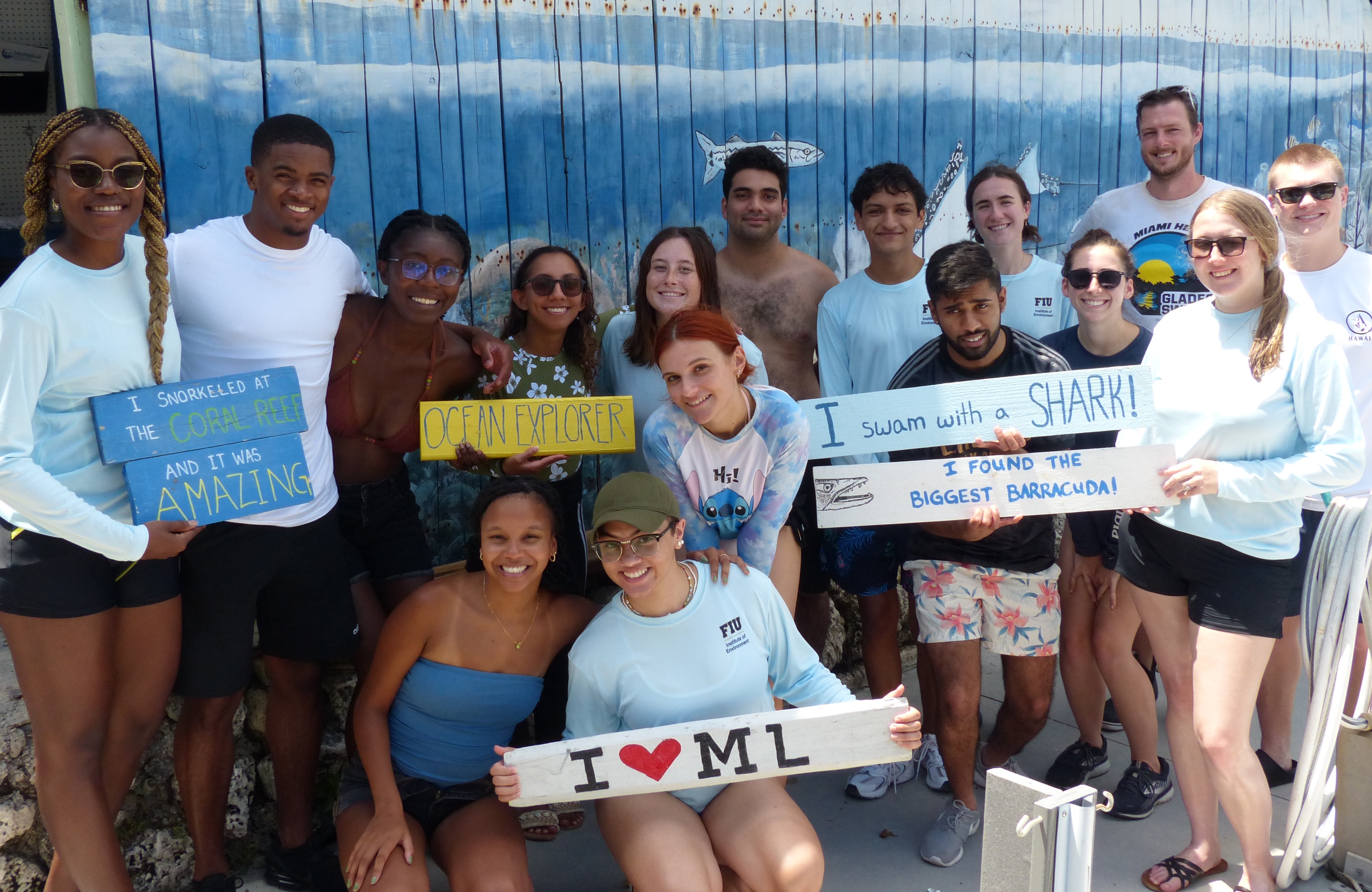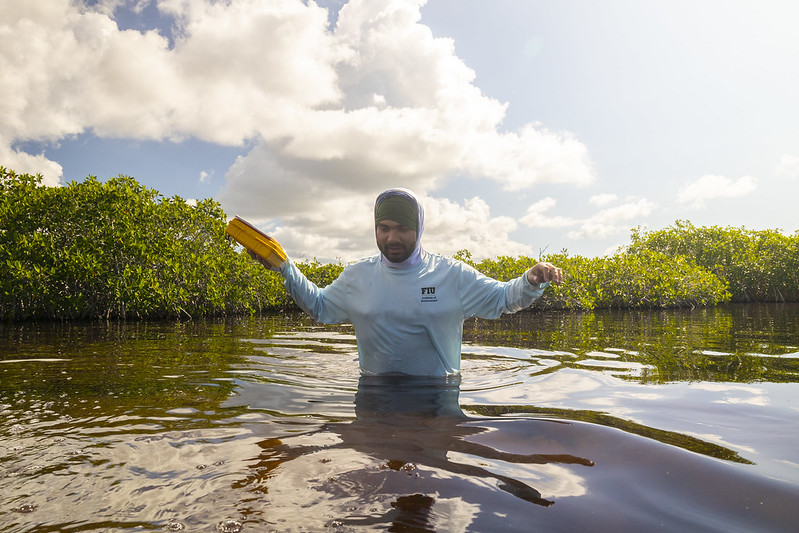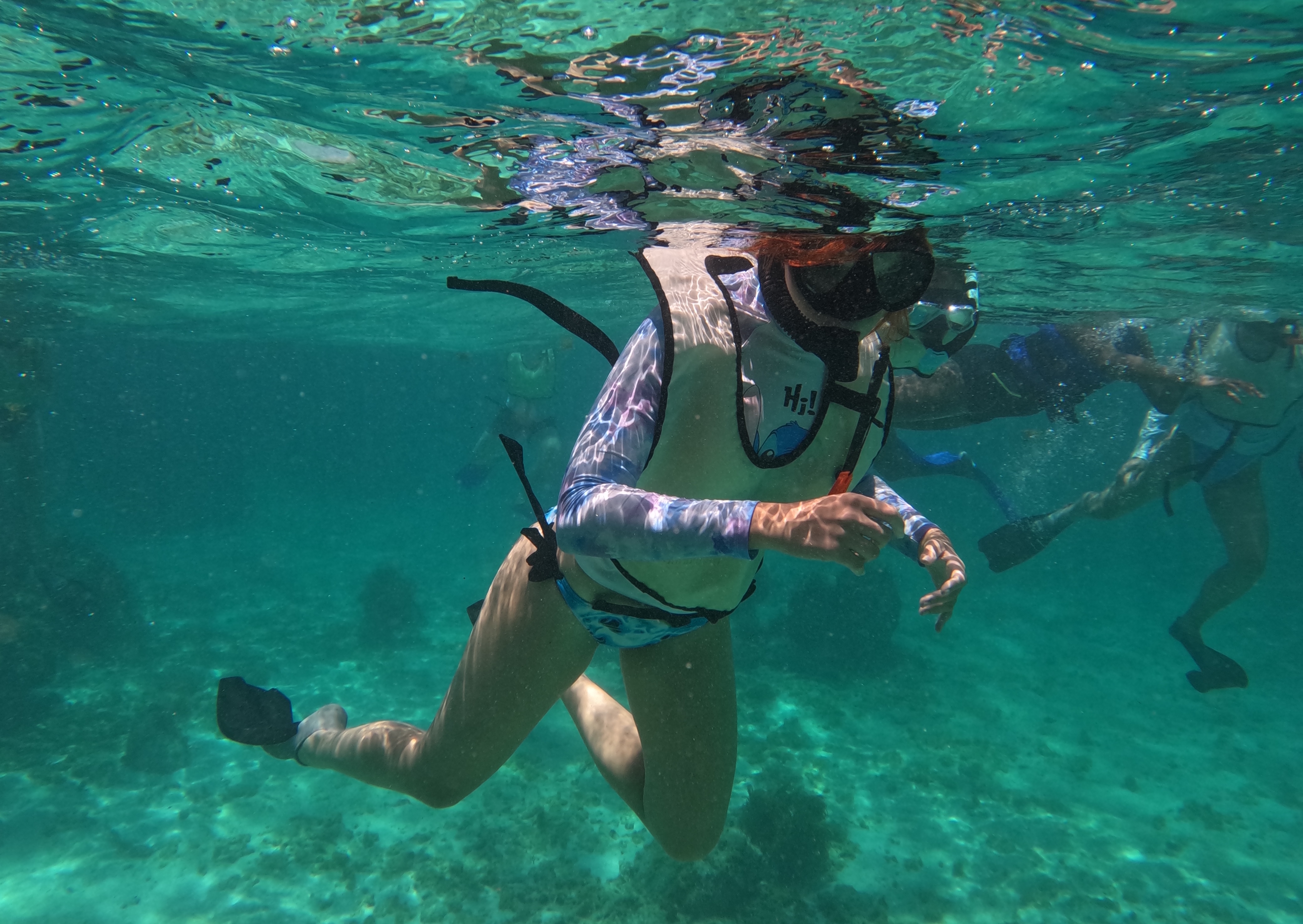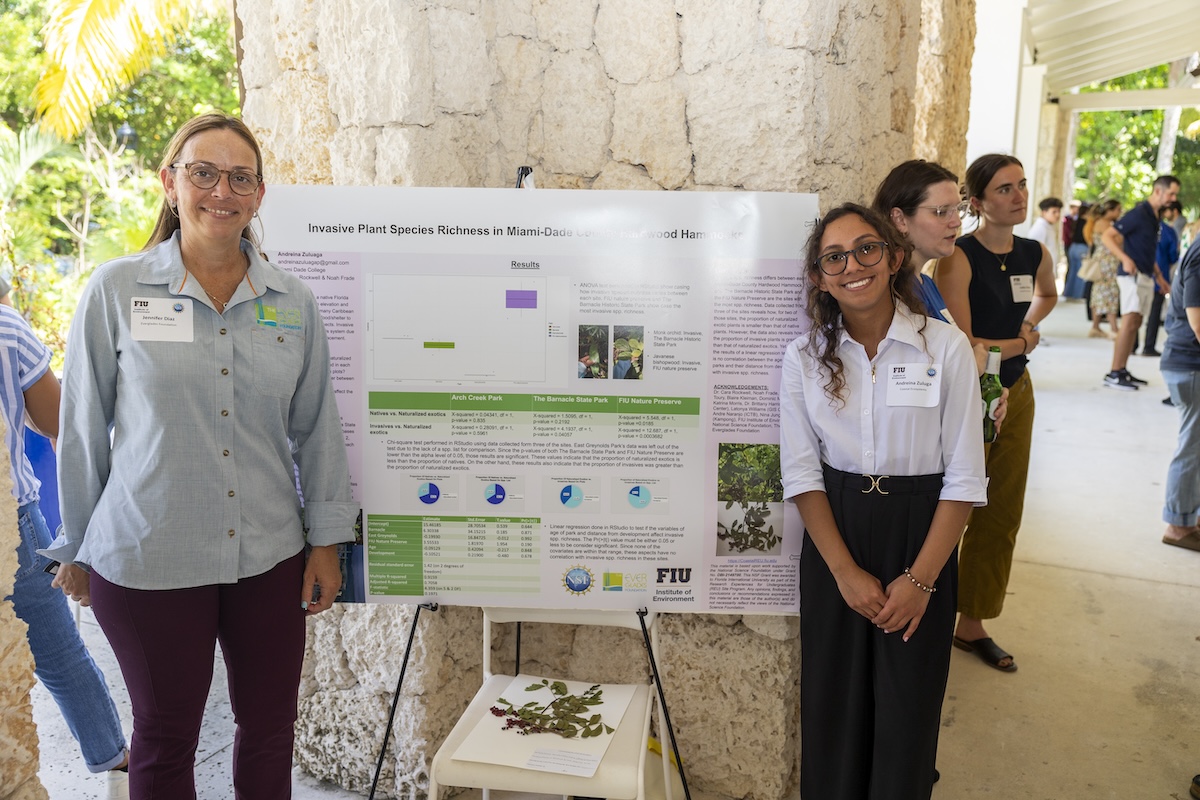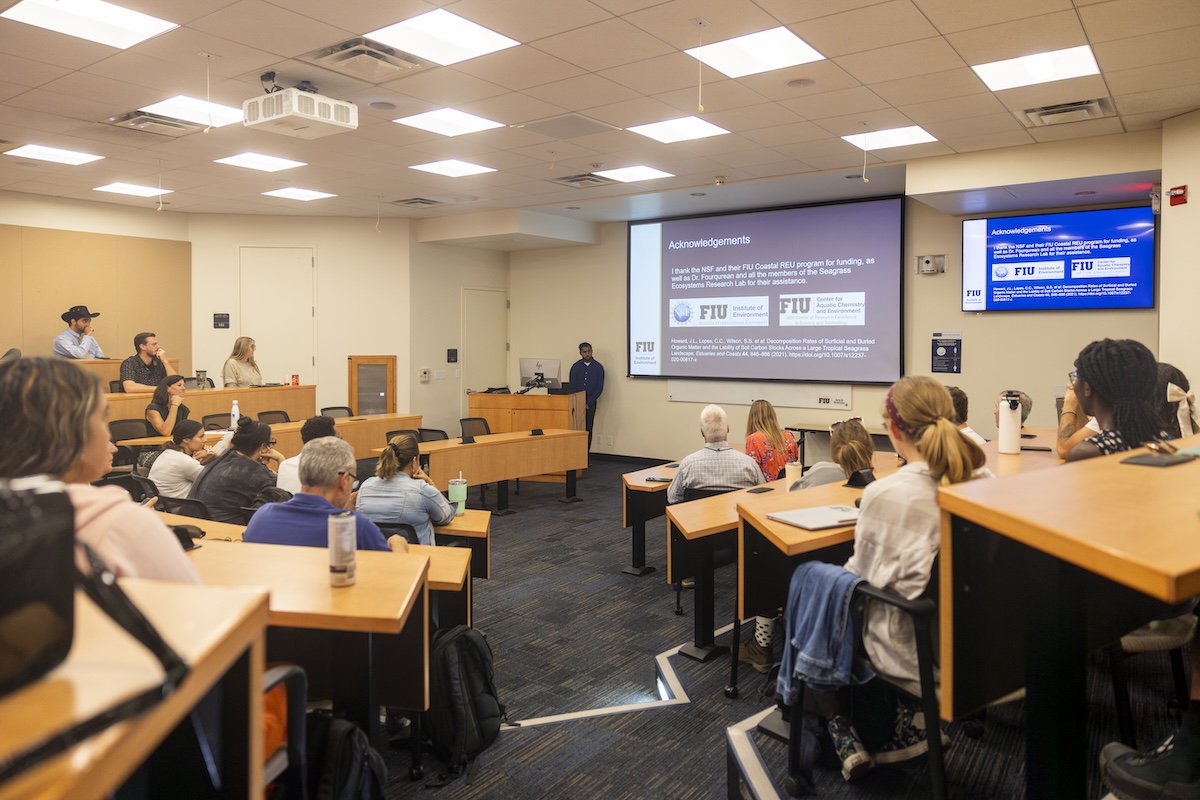POSTPONED
The 2025 Summer program is postponed. Please check back in Fall 2025 when the application window will open for 2026.
Our REU application portal will be open from December 2, 2024 through Monday, February 3, 2025. Link to application portal on NSF ETAP site
The Coastal Ecosystems Research Experience for Undergraduates (REU) Site program is a 10-week paid research fellowship located on the campuses of Florida International University in Miami, FL. This year's program runs from May 19, 2025 - July 25, 2025.
The Research Theme of the REU Site is the ecology of coastal ecosystems across gradients of human impact. Specifically, our research looks at coastal ecosystem ecology, water quality, and the connections among the Everglades wetlands, coastal mangrove forests, seagrass beds and shallow water coral reefs. Our goal is to detect the sources, transport and transformation of environmental stressors and the ecosystem responses under rapid changing climate and land-use.
In the context of these connected, coastal ecosystems and their importance to human health and wellbeing, it is critical to understand the ecological, hydrological and biogeochemical processes that govern the fate of environmental stressors and their impacts on the coastal ecosystems.
The summer research experience for undergraduates includes a stipend of $6000 plus a $1200 food allowance for successful completion of the full 10-week program, as well as roundtrip travel to Miami and campus housing. For summer 2024, research opportunities will be based on the FIU's Biscayne Bay Campus in North Miami, Florida.
Program
The program is comprehensively studying the ecology of coastal ecosystems. These efforts examine the changes across gradients of human impact among the Everglades, wetlands, coastal mangrove forests, seagrass beds and shallow water coral reef systems. The summer program includes the following elements:
- Research: Provide research expertise for undergraduate working on individual or group projects with the guidance from both a faculty researcher and a near-peer mentor.
- Education: Students and mentors establish regular meetings and lab schedules to share successes and challenges, and leverage programmatic resources.
- Community: Build a sense of community among participants and mentors all dedicated to advancing scientific research.
- Professional Development: Enhance student skills needed for successful future careers. Topics include scientific writing, Everglades restoration, data management and statistical analysis, developing impactful presentations, fellowship applications, building resumes, and career pathways.
Link to application portal on NSF ETAP site
Program Highlights
POSTPONED
The 2025 Summer program is postponed. Please check back in Fall 2025 when the application window will open for 2026.
Important Dates
Application: Application portal closes February 3, 2025 @ 11:59pm (ET)
Application Reviewed: Month of February
Mid-March: Candidates will be notified of acceptances/rejections
Program Dates: May 19th – July 25th (10 weeks)
Orientation: Monday May 19th
Poster Session: Wednesday, July 23th, 2025
Symposium: Thursday, July 24th, 2025
Mentors
| Mentor (BBC) | Research area(s) | Website |
Bobadilla, Leonardo | Research focuses on creating robotics planning algorithms, implementing realistic robotic simulations, and performing controlled conditions experiments and field deployments for heterogeneous robot teams (Surface, Ground, Underwater, and Aerial) to monitor South Florida ecosystems. | Leo Bobadilla |
Boswell, Kevin | Research focuses on understanding the abiotic and biological factors that mediate the distribution, behavioral patterns, energetics and natural ecology of oceanic and coastal marine animals and studies these processes using advanced technologies, with a primary focus on acoustic methodologies. | Kevin Boswell |
Duran, Alain | The research will focus on the ecological dynamics of coral reef seaweeds, particularly turf-forming algae and crustose coralline algae. These two groups are the most abundant algae on Anthropocene coral reefs. However, we rarely scratch the surface of their ecological function and role in coral reef resilience. | Alain Duran |
Gardinali, Piero | Research focuses on the use of advanced analytical chemistry techniques such as high- resolution mass spectrometry to address environmental problems related to the release of treated or untreated domestic wastewater, agricultural and urban storm water runoff to coastal environments | Piero Gardinali |
Harborne, Alastair | Works on a variety of topics related to the ecology and behavior of Caribbean coral reef fishes, and the impacts of environmental change. A key aim of our research is to assist reef conservation. For example, a key current project – which the student will likely assist with – is the integration of sufficient seagrass beds into marine reserves to support the foraging of reef fishes. | Alastair Harborne |
Heithaus, Mike | Research will involve both field and lab work. Field work will include some days of shark fishing in the Rookery Bay region of Florida. REU student will then be responsible for preparation and processing of samples collected. REU student will also learn sample processing methodology and stable isotope sample preparation. Student will have the opportunity to run preliminary analysis of SIA data of various shark species and prey species as their REU research project. | Mike Heithaus |
Manning, Schonna | Research in the Manning laboratory is focused on understanding why microalgae, including cyanobacteria, form blooms and proliferations often accompanied by potent toxins. The research group utilizes comprehensive 'omics techniques, including the analysis of environmental DNA coupled with transcriptomics, proteomics, and metabolomics, for the top-down and bottom-up evaluation of complex microalgal communities and their microbiome. Current projects monitor microalgal communities in coastal and inland waters of Florida, including Biscayne Bay, the Everglades, and Wakulla Springs, as well as freshwater reservoirs in Central Texas. | Schonna Manning |
Papastamatiou, Yannis | The REU student will be working closely with a near-peer mentor in the lab on the BBC campus. The project will be focused around understanding the various physiological implications of decreased oxygen on two decapod crustaceans (Caribbean Spiny Lobster & Caribbean King Crab). The student will have the opportunity to participate in the collection of animals from the Florida Keys, learn about the aging process of these animals, and conduct laboratory-based experiments to assess the physiological fitness of the animals under decreased oxygen. | |
Santos, Rolando | Research will focus on epiphyte and trophic ecology in seagrass habitats. Field work will involve collecting samples from Biscayne Bay, Florida Bay, and/or the Florida Keys. The student's project will center on assessing epiphyte biomass and their spatial distributions on seagrass. Key tasks include determining percent cover of epiphytes on seagrass blades and processing samples for stable isotope analysis. Lab work will involve image analysis, data interpretation, and preparing epiphyte and seagrass samples for stable isotope studies. This research aims to quantify epiphyte loading on seagrass and understanding trophic relationships, providing insights into the health and dynamics of these coastal marine ecosystems. | Rolando Santos |
Soares Quinete, Natalia | Monitoring and assessment of the occurrence, fate and transport of PFAS in environmental and biological samples. | Natalia Soares Quinete |
POSTPONED
The 2025 Summer program is postponed. Please check back in Fall 2025 when the application window will open for 2026.
Apply
The Coastal REU 2025 application portal closes on February 3nd @ 11:59pm (ET).
We encourage applications from students who are enthusiastic about participating in a collaborative and hands-on learning environment, experiencing the iconic coastal ecosystems of South Florida, attaining professional skills to prepare for multiple career pathways, and developing a network of researchers and peers from across the country. Significant past experience in ecological research is NOT required.
Eligibility
- Potential REU's must be U.S. citizens, U.S. nationals, or permanent residents of the United States
- Applicants must plan to attend the entire 10-week program (May 19, 2025 through July 25, 2025).No exceptions. All in-person attendance.
- Applicants must plan to be full-time students enrolled in a college/university for at least one semester after the summer program (e.g., Fall 2025).
- Applicants should be undergraduate students in the discipline/major related to the Mentors project list that is chosen.
- Applicants should have completed at least two semesters of coursework in environment-related topics.
- Applicants cannot be enrolled in summer coursework while enrolled in the NSF Site REU program or work a part-time job.
- Applicants must attend and participate in the professional development workshops that occur 1x a week.
- Applicants must fulfill program objectives completely, to receive the full stipend (awarded in three (3) installments: beginning, middle, end).
How to Apply
The application window is Dec. 2, 2024- Feb. 3, 2025. Late/incomplete applications will not be accepted. Applications will be reviewed in early February. All applicants will be officially notified of their status (acceptance/rejection) by email in mid-March.
Applicants will be expected to submit the following items:
- Application via NSF ETAP portal
- Unofficial copy of all relevant college transcripts
If you have any questions, please email CoastalREU@fiu.edu.
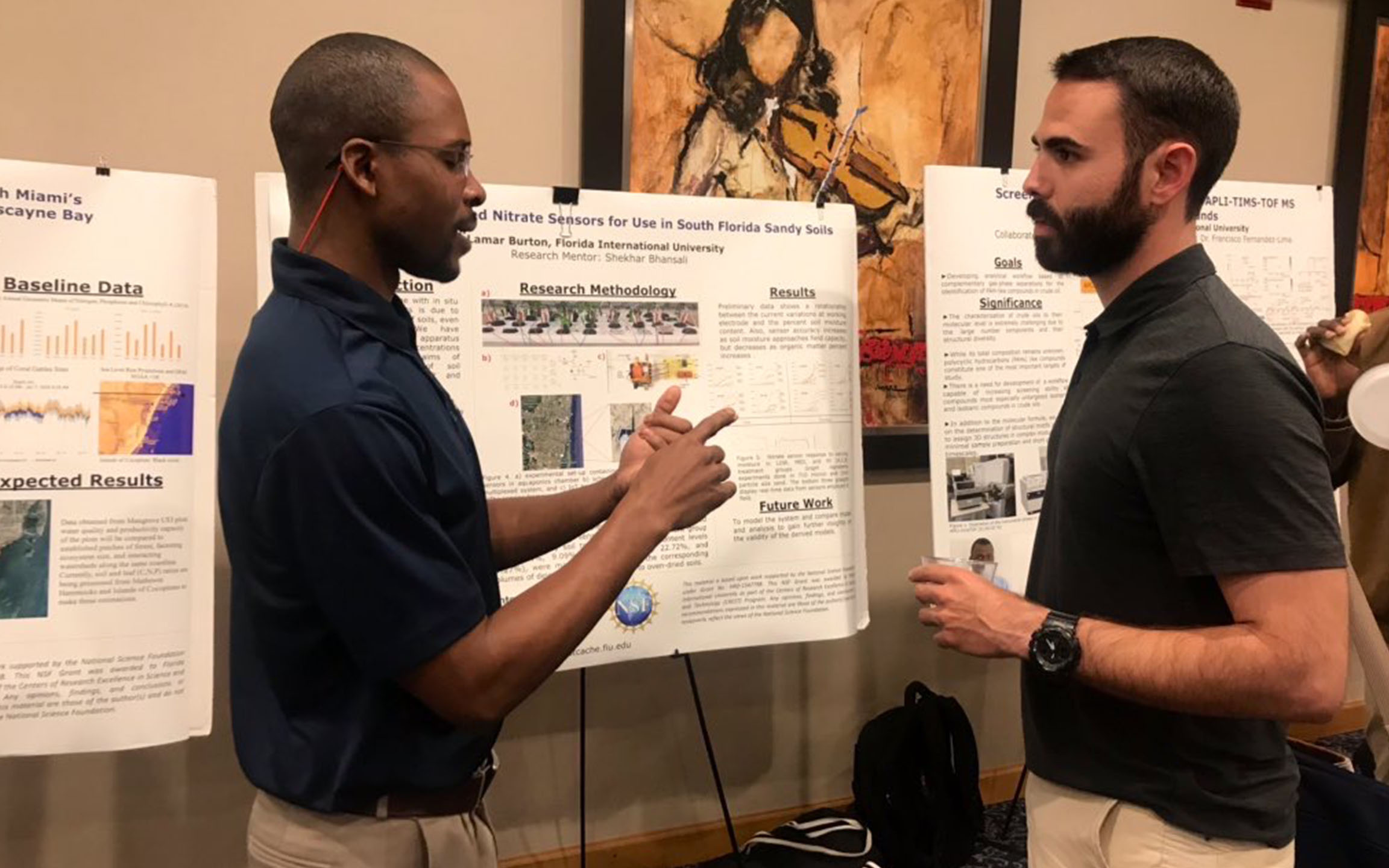
Student Success
Our REU students go on to publish their work in renowned journals and present their research at conferences worldwide. Below is a list of the publications, presentations and posters led by our current REU students and alumni.
- Rodríguez-Casariego Javier A., Mercado-Molina Alex E., Garcia-Souto Daniel, Ortiz-Rivera Ivanna M., Lopes Christian, Baums Iliana B., Sabat Alberto M., Eirin-Lopez Jose M. Genome-Wide DNA Methylation Analysis Reveals a Conserved Epigenetic Response to Seasonal Environmental Variation in the Staghorn Coral Acropora cervicornis. Frontiers in Marine Science, 2020, 7, 822. DOI: 10.3389/fmars.2020.560424
- Chapman, J.G. The Impacts of Copper Contamination on Aquatic Predator-Prey Interactions: Hohonu Academic Journal, 2020, 18, 94-101.
- Lemos Leila, Gantiva Laura, Kaylor Catherine, Sanchez Alessandra, Quinete Natalia. American oysters as bioindicators of emerging organic contaminants in Florida, United States. Science of the Total Environment, 2022, 835, 155316. DOI: 10.1016/j.scitotenv.2022.155316
- Ogunbiyi Olutobi Daniel, Massenat Neumiah, Quinete Natalia. Dispersion and stratification of Per-and polyfluoroalkyl substances (PFAS) in surface and deep-water profiles: A case study of the Biscayne Bay area. Science of the Total Environment, 2024, 909, 168413. DOI: 10.1016/j.scitotenv.2023.168413
- Rodemann Samuel, Gonzalez Derek, Ferreira Marilia. Fine-scale movement patterns of Goliath Grouper (Epinephelus itajara) in relation to environmental and biological factors. Marine Pollution Bulletin, 2023, 193, 114650. DOI: 10.1016/j.marpolbul.2023.114650
- Boehme-Terrana Linae, Roux-Osovitz Michelle, Goergen Erin, Mancke Harrison, Fisher Samantha, Gravinese Philip M. Habitat selection by post-settlement juvenile stone crabs (Menippe mercenaria) and predation risk in shallow near-shore habitats. Journal of Experimental Marine Biology and Ecology, 2022, 547, 151679. DOI: 10.1016/j.jembe.2021.151679.
- Velasco S., Glasmann H. K., Boswell K. M. Using active acoustics to analyze the relationship between lunar phase and diel vertical migration. Poster presented at Ocean Sciences Meeting, New Orleans, LA, February 22, 2024.

